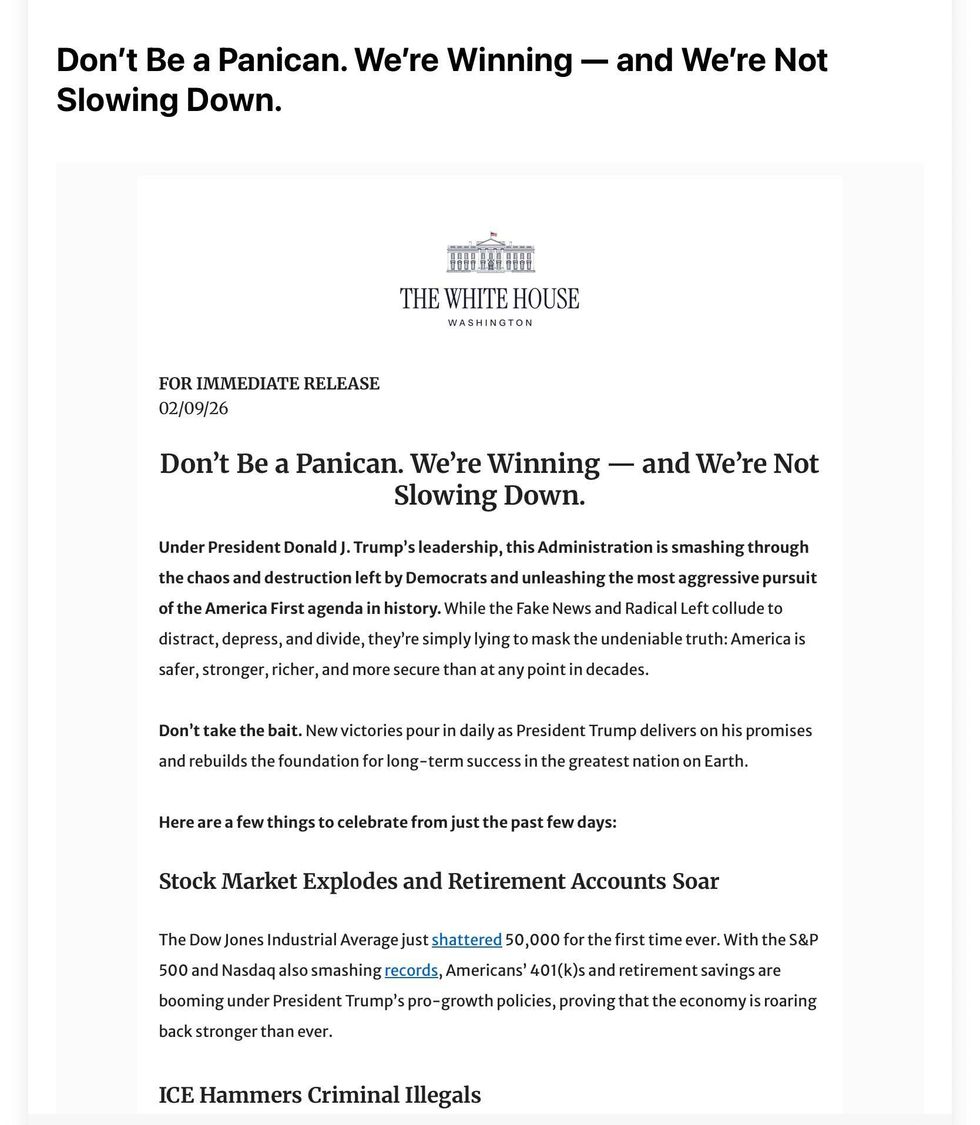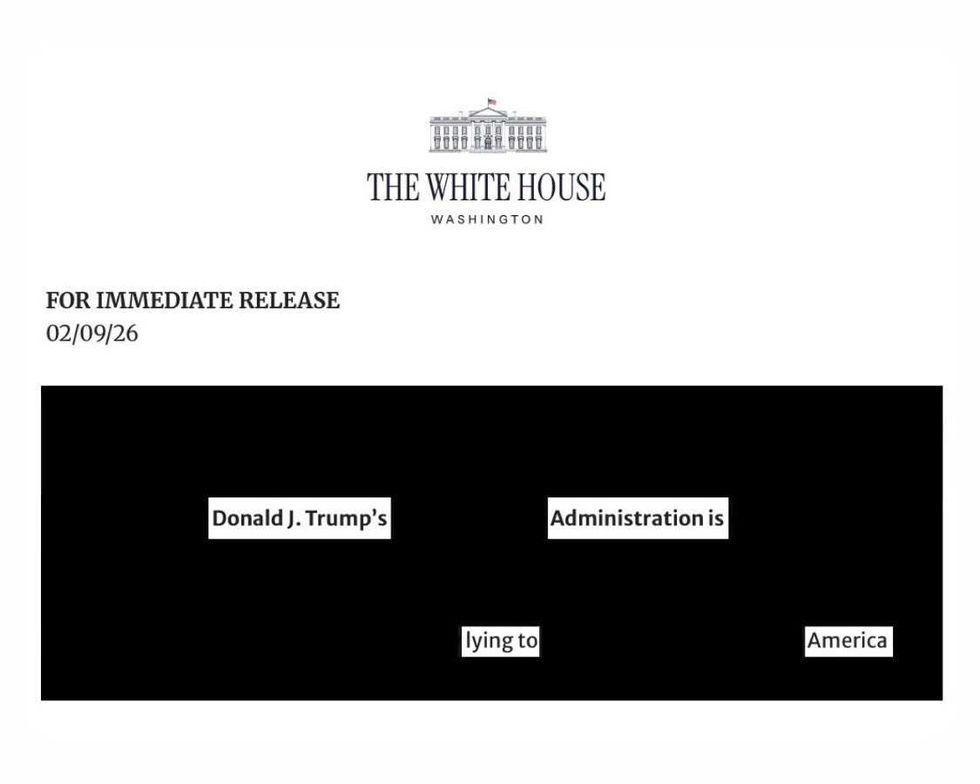Construction equipment manufacturer Caterpillar blamed its disappointing stock market performance, which kept its adjusted earnings guidance for 2018 steady, falling short of the increase analysts had projected, on President Donald Trump's tariffs. The company's analysts say "higher material costs due to steel and tariffs" drove up manufacturing costs, which caused its stock to dive 8 percent despite an 18 percent increase in company revenue.
If you were to ask the president, however, you'd hear a different story. Earlier today, the president responded to criticism of the tariffs his administration imposed on steel and aluminum imports, insisting that tariffs would continue so long as other countries don't "give us a fair Trade Deal."
Caterpillar's announcement comes after electric vehicle manufacturer Polaris Industries said its suppliers "must help offset the cost of President Donald Trump’s trade wars if they want to keep doing business," according to Bloomberg.
Polaris is “making good progress with domestic suppliers saying, ‘Hey, we’re not taking that price increase.’ Or more recently, telling our Chinese suppliers, ‘Hey, if you want to continue to be a supplier to us, you’re going to have to take some of these costs,’’’ said Chief Executive Officer Scott Wine, who noted that the president's trade wars caused Polaris's stock price to dip 31 percent.
The president remains steadfast in his belief that tariffs are necessary to address the signs of what he believes to be an era of waning American influence on international markets.
In March, shortly before confirming that the U.S. would impose tariffs on aluminum and steel, Trump attracted criticism for claiming that trade wars “are good, and easy to win.”
“When a country (USA) is losing many billions of dollars on trade with virtually every country it does business with, trade wars are good, and easy to win,” he wrote at the time. “Example, when we are down $100 billion with a certain country and they get cute, don’t trade anymore-we win big. It’s easy!”
The president appeared to ignore much of the controversy surrounding his announcement. Instead, he doubled down on his belief that “We must protect our country and our workers.”
Later, he seemed to offer justifications for his decision, writing: “When a country Taxes our products coming in at, say, 50%, and we Tax the same product coming into our country at ZERO, not fair or smart. We will soon be starting RECIPROCAL TAXES so that we will charge the same thing as they charge us. $800 Billion Trade Deficit-have no choice!”
According to two officials who at the time spoke to NBC News on condition of anonymity, Trump’s “decision to launch a potential trade war was born out of anger at other simmering issues and the result of a broken internal process that has failed to deliver him consensus views that represent the best advice of his team.”
In the words of one official, the president became “unglued.”
Over the summer, two Republican members of Congress also called out the president after he took to Twitter with a bizarre claim about tariffs and how they operate.
“Tariffs are the greatest!” the president claimed, before saying that leveling tariffs are a “simple” repercussion of negotiating trade deals that would impact the United States “unfairly.”
But the president’s understanding of economics is lacking, as Representarive Justin Amash (R-MI) pointed out.
“Umm… no. Tariffs are taxes. American consumers are the ones who get hit with U.S.-imposed tariffs,” Amash wrote. He added that how other countries approach economics “does not justify our own economic incompetence.”
House Speaker Paul Ryan (R-WI) also rebuffed the president’s claim and backed up Amash’s remarks, saying, “I’ve made it pretty clear I don’t think tariffs are the right answer. I don’t support tariffs. I think tariffs are taxes, and I think there are better tools that we can use.”
Both Amash and Ryan are correct: Tariffs are taxes on imports or exports between sovereign states. In the United States, many tariffs are paid at the time of entry into the country via a U.S. customs broker or agent, and that doesn’t necessarily account for duties and fees that may apply to the import.
Trump’s tweet comes as the U.S. and China spar tensely after Trump announced an additional $200 billion in tariffs on Chinese goods, in an attempt to get businesses to use less Chinese-produced goods and opt for goods made in the U.S. or by allies with whom the country has less precarious trade relationships.
These tariffs don’t benefit the U.S. or, as Trump puts it, “the piggy bank that’s being robbed.” The tariffs actually result in production cost increases for businesses that use imported Chinese products. These increases happen because businesses either must use more expensive domestic parts or pay more for the finished products.
Trump’s tariffs also focus on intermediary goods, or parts, which many small-to-medium-sized U.S. businesses use to make finished products. Consequently, the increased cost of parts place businesses into positions where they must either raise prices on their goods and pass the cost on to the consumer, reduce their workforce, or shutter U.S. operations and move overseas to avoid tariffs altogether.







 The White House
The White House @JBPritzker/X
@JBPritzker/X






 @glammy1217/TikTok
@glammy1217/TikTok @glammy1217/TikTok
@glammy1217/TikTok @glammy1217/TikTok
@glammy1217/TikTok @glammy1217/TikTok
@glammy1217/TikTok @glammy1217/TikTok
@glammy1217/TikTok @glammy1217/TikTok
@glammy1217/TikTok @glammy1217/TikTok
@glammy1217/TikTok @glammy1217/TikTok
@glammy1217/TikTok @glammy1217/TikTok
@glammy1217/TikTok @glammy1217/TikTok
@glammy1217/TikTok @glammy1217/TikTok
@glammy1217/TikTok @glammy1217/TikTok
@glammy1217/TikTok @glammy1217/TikTok
@glammy1217/TikTok @glammy1217/TikTok
@glammy1217/TikTok @glammy1217/TikTok
@glammy1217/TikTok @glammy1217/TikTok
@glammy1217/TikTok @glammy1217/TikTok
@glammy1217/TikTok @glammy1217/TikTok
@glammy1217/TikTok @glammy1217/TikTok
@glammy1217/TikTok @glammy1217/TikTok
@glammy1217/TikTok @glammy1217/TikTok
@glammy1217/TikTok @glammy1217/TikTok
@glammy1217/TikTok
 @peachie.peach21/TikTok
@peachie.peach21/TikTok @peachie.peach21/TikTok
@peachie.peach21/TikTok @peachie.peach21/TikTok
@peachie.peach21/TikTok @peachie.peach21/TikTok
@peachie.peach21/TikTok @peachie.peach21/TikTok
@peachie.peach21/TikTok @peachie.peach21/TikTok
@peachie.peach21/TikTok @peachie.peach21/TikTok
@peachie.peach21/TikTok @peachie.peach21/TikTok
@peachie.peach21/TikTok @peachie.peach21/TikTok
@peachie.peach21/TikTok @peachie.peach21/TikTok
@peachie.peach21/TikTok @peachie.peach21/TikTok
@peachie.peach21/TikTok @peachie.peach21/TikTok
@peachie.peach21/TikTok
 @lazywisdom2/TikTok
@lazywisdom2/TikTok @lazywisdom2/TikTok
@lazywisdom2/TikTok @lazywisdom2/TikTok
@lazywisdom2/TikTok @lazywisdom2/TikTok
@lazywisdom2/TikTok @lazywisdom2/TikTok
@lazywisdom2/TikTok @lazywisdom2/TikTok
@lazywisdom2/TikTok @lazywisdom2/TikTok
@lazywisdom2/TikTok @lazywisdom2/TikTok
@lazywisdom2/TikTok @lazywisdom2/TikTok
@lazywisdom2/TikTok @lazywisdom2/TikTok
@lazywisdom2/TikTok